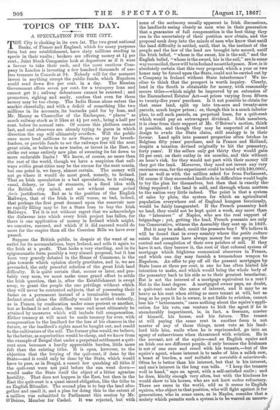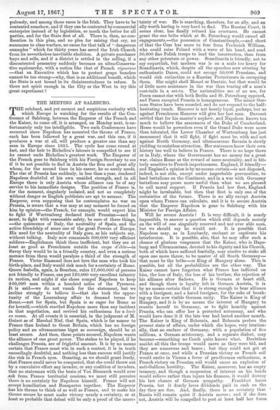TOPICS OF THE DAY.
A SPECULATION FOR THE CITY. THE City is choking in its own fat. The two great national Banks, of France and England, which for many purposes form but one establishment, have sixty millions sterling in specie in their vaults ; brokers are offering money at per cent., Joint Stock Companies look at depositors as if it were a favour to take their cash, and the most cautious Com- pany in London is investing a few hundred thousands of use- less treasure in Consols at 94. Nobody will for the moment invest in anything except the public funds, which Napoleon could send down five per cent. in a day. The Russian Government offers seven per cent. for a trumpery loan and cannot get it ; railway debentures cannot be renewed ; and promoters, sighing and seedy, confess that even for them money may be too cheap. The India House alone enters the market cheerfully, and with a deficit of something like two millions in its accounts, its barracks paid for by loan, and Mr. Massey as Chancellor of the Exchequer, " places " as much railway stock as it likes at 4i per cent., being a half per cent. below its normal rate. Of course this plethora cannot last, and cool observers are already trying to guess in which direction the cup will ultimately overflow. Will the public once more lend millions to new States, or pay for breech- loaders, or provide funds to set the railways free till the next great crisis, or believe in new trades, or invest in the East, or strike out some entirely new plan of sweating its fat down to more endurable limits ? We know, of course, no more than the rest of the world, though we have a suspicion that rail- ways within great cities may be the excuse for the next mania, but one point is, we fancy, almost certain. The money will not go where it would do most good, namely, to Ireland. That an Irish speculation is a bad speculation, be it railway, canal, fishery, or line of steamers, is a fixed idea with the British city mind, and not without some prima facie justification. Bad as is the position of the English Railways, that of the Irish is still worse, so bad, indeed, that perhaps the first great demand upon the reservoir now so rapidly filling may be for a State loan to buy the Irish Railways. Yet it is not without regret that we acknowledge the disfavour into which every Irish project has fallen, for there is one application of money in Ireland which might, we conceive, succeed, and which if it did succeed would do more for the empire than all the Coercion Bills we have ever passed.
Suppose the British public, in despair at the want of an outlet for its accumulations, buys Ireland, and sells it again to the Irish at It profit. That looks a very startling, and in its epigrammatic form possibly a very absurd proposal, but it has been very gravely debated in the House of Commons, is the plan towards which opinion slowly gravitates, and is, we are persuaded, the only peaceful solution of the great Irish land difficulty. It is quite certain that, sooner or later, and pro- bably very soon, we must make some grand effort to settle the Irish question, that is, after the Establishment is swept away, to grant the people the one privilege without which they will never be contented subjects, that of possessing their farms on a permanent instead of a terminable tenure. If Ireland stood alone the difficulty would be settled violently, as in France, by confiscation under some pretext or another, but as Ireland is not alone, the same end must ultimately be attained by measures which will include full compensation. Either tenancy at will must be made tenancy for ever, with compensation to the landlord for the loss of his chances in the future, or the landlord's rights must be bought out, and resold to the cultivators of the soil. The former plan would, we believe, be thebetter, as superiorities would be cheap, and we know from the example of Bengal that under a perpetual settlement a quit- rent soon becomes a hardly appreciable burden, little more felt than the existing tithe, it is open, however, to the objection that the levying of the quit-rent, if done by the State—and it could only be done by the State, which would have to pass, as in Bengal, a sunset law quashing all titles if the quit-rent were not paid before the sun went down— would make the State itself the object of a bitter agrarian hostility. That does not happen in the East, but then in the East the quit-rent is a quasi sacred obligation, like the tithe to an English Ritualist. The second plan is to buy the land alto- gether and resell it, and a plan for doing this to the extent of a million was submitted to Parliament this session by Mr. O'Beirne, Member for Cashel. It was rejected, but with none of the acrimony usually apparent in Irish discussions,. the landlords seeing clearly as men wise in their generation that a guarantee of full compensation is the best thing they can in the uncertainty of their position now obtain, and the proposal sank deep into the minds of men who know that until the land difficulty is settled, until, that is, the instinct of the people and the law of the land are brought into accord, until the Irish belief, "whose is the sweat, his is the soil," and the English belief, "whose is the sword, his is the soil," are in some way reconciled, there will be inIreland no settled peace. Now, is it absolutely certain that this very proposal, which a year or two hence may be forced upon the State, could not be carried out by a Company in Ireland without State interference ? We in- cline to think that the prospect is worth inquiry. Clearly, land in the South is obtainable for money, with reasonably secure titles—which might be improved by an extension of the Encumbered Estates' Act—at prices varying from fifteen) to twenty-five years' purchase. Is it not possible to obtain for that same land, split up into ten-acre and twenty-acre parcels, much larger prices ; or, though this is a much inferior plan, to sell such parcels, on perpetual lease, for a quit-rent which would pay an extravagant dividend. Irish members, it is clear from their support of Mr. O'Beirne's motion, think it possible, and though they may be suspected of a latent design to evade the State claim, still analogy is in their. favour. Land split into peasant properties often fetches in Belgium fifty years' purchase, and in France and Holland; despite a taxation devised originally to hit the peasantry, forty years'. If the sellers only got thirty they would gain 33 per cent, on their outlay in six months, and this without. an hour's risk, for they would not part with their money tilt they got the land. Moreover, they need not invest any very enormous sum, for the experiment could be tried with 100,00014 just as well as with the million asked for from Parliament, Of course if they succeeded landlords in difficulties would begin to try the plan for themselves, but then that is exactly the thing required ; the land is sold, and through whom matters. to the nation very little indeed. The point is that a system of sales by plots, the system for which an agricultural population everywhere out of England hungers ferociously, would be fairly inaugurated. If the French peasantry had) no land, they could not be kept quiet a week, any more than the " labourers " of Naples, who are the real support of brigandage ; yet, getting the land, French peasants are only too Conservative, witness the Assembly they sent up in 1849..
But it may be asked, could the peasants buy ? We believe it will be found that in every country where the petite culture. exists the peasants have always money for one purpose, the control and completion of their own patches of soil. If they have it not, they borrow it, the root of that colossal system of mortgage which frightens economical observers in France, and which one day may furnish a tremendous weapon to Napoleon. An offer to pay off all the peasant mortgages by State loans at three per cent, is one he has often hinted his intention to make, and which would bring the whole body of the peasantry back to his side as to their greatest benefactor. Butis not the interest of a mortgage equivalent to a rent ?- Not in the least degree. A mortgaged owner pays, no doubt, a quit-rent under the name of interest, and it may be as. heavy as his rent when sitting as mere tenant at will, but as long as he pays it he is owner, is not liable to eviction, cannot. lose his "betterments," cares nothing about the squire's appli- cation for his vote, can venture to kick the agent if he is. unendurably impertinent, is, in fact, a freeman, master of himself, his house, and his future. The tenant- at will paying the same rent in another form is not master of any of those things, must vote as his land- lord bids him, smile when he is reprimanded, go into an agony of subservience when threatened with eviction. He is. the servant, not of the squire—and an English squire and an Irish one are different people, if only because the Irishman is not of one race and creed with his tenants,—but of the squire's agent, whose interest is to make of him a milch cow, a beast of burden, a serf taillable et corve'able a misericorde. Often he is better than his interest, but that is his interest, and one's interest in the long ran tells. "I keep the tenants well in hand," says an agent, with a self-satisfied smile ; and he does, kindly enough very often, but with the kindness he would show to his horses, who are not hurt unless refractory. There are races in the world, odd as it seems to English squires, who object to that position, who will fight against it for generations, who in some cases, as in Naples, consider that a , jisociety which permits such a system is to be warred on unscra- pulously, and among those races is the Irish. They have to be contented somehow, and if they can be contented by commercial enterprise instead of by legislation, so much the better for all parties, and for the State first of all. There is, then, no con- fiscation in this plan, and no plea for raising that cry, no summons to class warfare, no cause for that talk of 'dangerous examples" which for thirty years has saved the Irish Church from its nevertheless inevitable abolition. A private purchaser buys and sells, and if a district is settled in the selling, if a discontented peasantry suddenly becomes an ultra-Conserva- -tive squirearchy, with a notion like that of French vignerons —that an Executive which has to protect grape bunches cannot be too strong—why, that is an additional benefit, which the State is not bound in its disinterestedness to refuse. Is -there not spirit enough in the City or the West to try this great experiment ?































 Previous page
Previous page